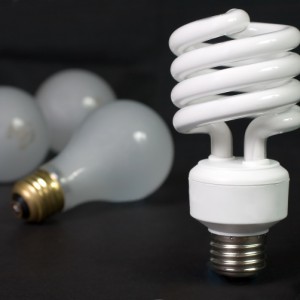Say Goodbye To Incandescent Bulbs As Government Ban Takes Effect

PHOTOS.COM
A law signed by President George W. Bush is set to enter its final phase in a long-term plan by Congress to phase the simple incandescent light bulb out of existence. Starting in 2014, you won’t be able to legally get your hands on household 60-watt and 40-watt incandescent bulbs.
Some artists, architects, photographers and people who do specialized work in medicine, engineering, research and other demanding fields prefer incandescent bulbs for the quality or the stability of the light they produce, despite their relative inefficiency compared to fluorescent and LED bulbs.Others question the benefit of alternatives to incandescent bulbs in saving energy or preventing environmental damage.
Standards outlined in the Energy Independence and Security Act, which Bush signed in 2007, make it illegal to manufacture or import 40- and 60-watt incandescent bulbs into the United States after Dec. 31 of this year, leaving it up to stores to sell off what they have left. Those same standards have already phased out the 100-watt bulb (in 2012) and 75-watt bulbs (this year).
And while the change was set in place in the name of conservation, critics argue Congress and the President ignored the role of free choice when they agreed to limit American consumers’ options. If the incandescent bulb is so bad, they argue, the free market will eventually drive them into marginal use anyway — just as film cameras still exist, but have been roundly eclipsed by digital cameras in the hands of average consumers.
According to The Heritage Foundation, the flap over phasing out incandescent bulbs reflects the government’s increasingly statist role in tinkering with even the smallest choices of American citizens:
Proponents of government-imposed efficiency standards and regulations will say, “So what? There are still plenty of lighting options on the shelves at Home Depot; we’re saving families money; and we’re reducing harmful climate change emissions.”The “so what” is that the federal government is taking decisions out of the hands of families and businesses, destroying jobs, and restricting consumer choice in the market. We all have a wide variety of preferences regarding light bulbs. It is not the role of the federal government to override those preferences with what it believes is in our best interest.Families understand how energy costs impact their lives and make decisions accordingly. Energy efficiency has improved dramatically over the past six decades — long before any national energy efficiency mandates.If families and firms are not buying the most energy-efficient appliance or technology, it is not that they are acting irrationally; they simply have budget constraints or other preferences such as comfort, convenience, and product quality. A family may know that buying an energy-efficient product will save them money in the long term, but they have to prioritize their short-term expenses. Those families operating from paycheck to paycheck may want to opt for a cheaper light bulb and more food instead of a more expensive light bulb and less food.Some may read this and think: Chill out — it’s just a light bulb. But it’s not just a light bulb. Take a look at the Department of Energy’s Federal Energy Management Program. Basically anything that uses electricity or water in your home or business is subject to an efficiency regulation.When the market drives energy efficiency, it saves consumers money. The more the federal government takes away decisions that are better left to businesses and families, the worse off we’re going to be.
No comments:
Post a Comment
Thanks for commenting. Your comments are needed for helping to improve the discussion.